LGBTQ+ Profiles in Pride
In honor of Pride Month, LGBTQ+ healthcare workers from across NewYork-Presbyterian reflect on their own paths to pride and how they’re working to improve the healthcare experience for all.
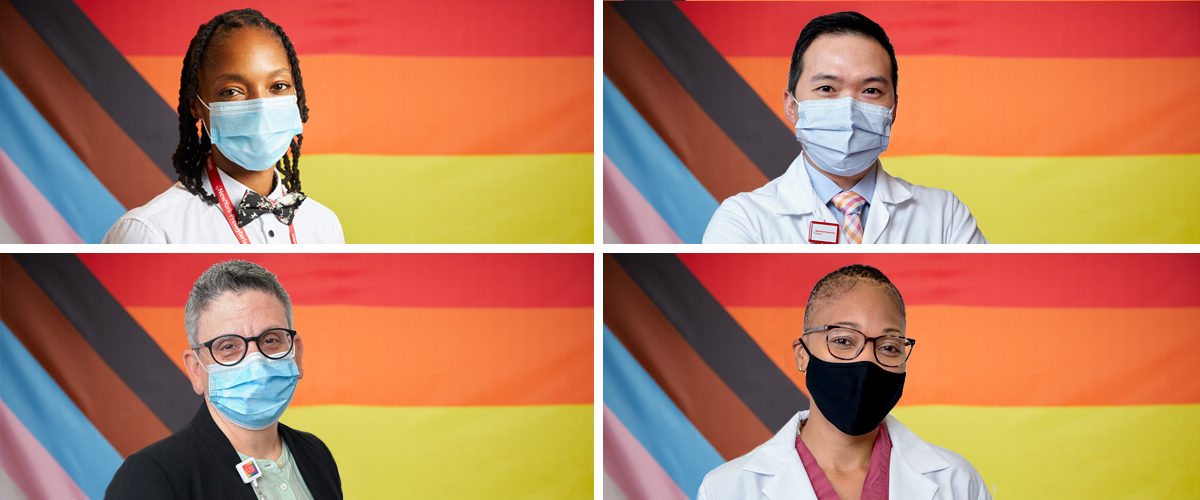
After a uniquely challenging year facing the COVID-19 pandemic and a rise in hate crimes, four healthcare workers, proud members of the LGBTQ+ community, reflect on why it’s more important than ever to celebrate Pride and continue the fight to ensure that every person is treated with dignity and respect.
These four individuals from across NewYork-Presbyterian — a doctor, a chaplain, a human resources director, and a patient care director — share their personal stories of pain and progress and what pride means to them.
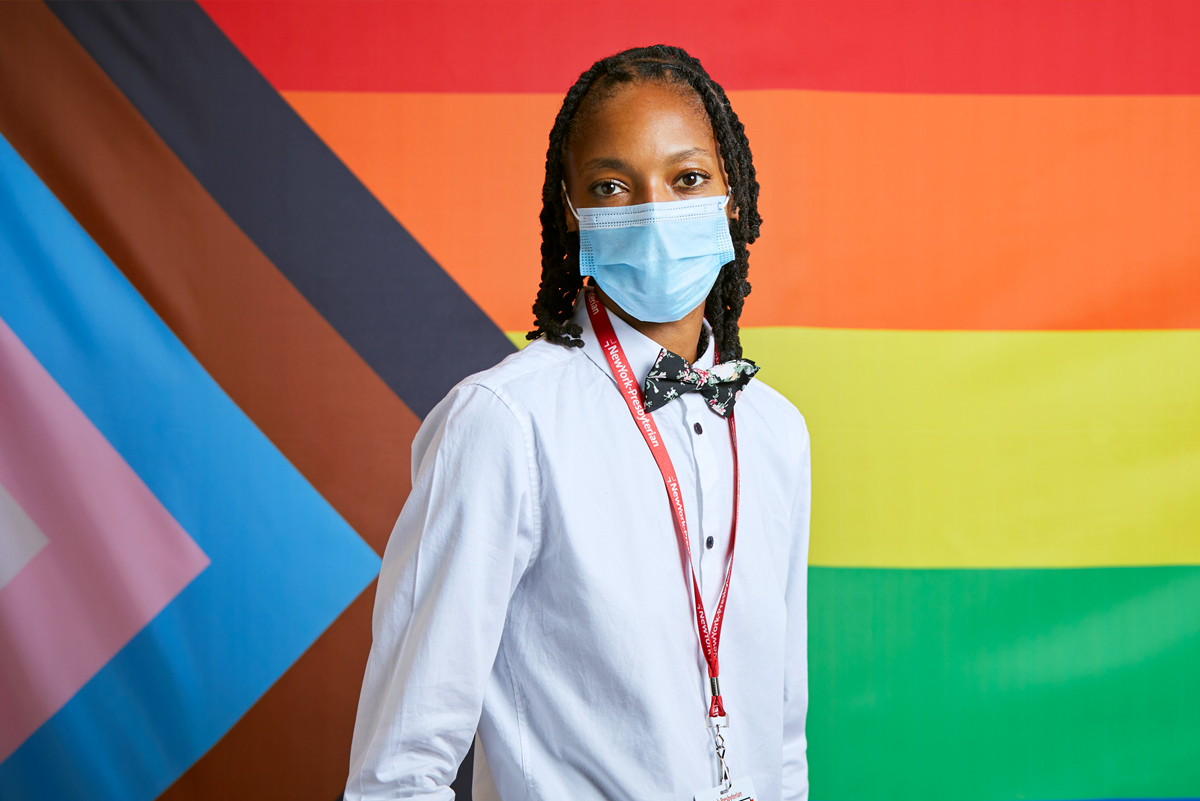
After hiding her own identity, she found a path to acceptance and uses it to help others.
Q Hailey
Staff Chaplain, NewYork-Presbyterian Brooklyn Methodist Hospital
When Q Hailey began her chaplain residency at NewYork-Presbyterian Brooklyn Methodist Hospital in 2017, she made a decision to be herself.
“In the past I would dress very feminine and try and perform heteronormative norms of society in the workplace,” says Hailey. “Most of my life, I was trying to fit into what everyone else wanted me to be.”
While she was at seminary school, she cultivated her relationship with God, which helped bring her to a place of acceptance, and during her clinical pastoral education at NewYork-Presbyterian Brooklyn Methodist Hospital, she began to embrace what makes her unique: “I love me, I love who I am.”
Now a staff chaplain on the hospital’s pastoral care team, Hailey, who is genderqueer, says embracing her identity and not conforming to gender norms helps her bring comfort to members of the LGBTQ+ community, particularly those who have been rejected by their families. “I am a visible representation of the thing that they’re not allowed to be, or their family rejects.
“This is who I am, and this is an opportunity to provide visibility to those who may need it,” Hailey says. “It’s intentional and important to me to visibly represent a community I’m part of that has been marginalized. There are people who you wouldn’t necessarily know identify as queer who have said to me, ‘I saw you and I felt a little bit more comfortable talking to you because of that.’”
She feels it is essential to be her true self to establish trust with those she seeks to comfort. “I try to make myself available to people in their vulnerable moments, particularly those in the LGBTQ+ community,” she says. “It is what I wish I had in those moments where I was tossed aside or in spaces that weren’t safe. I try to bring that compassion into the hospital.”
As a chaplain, Hailey provides spiritual guidance and pastoral care to patients and their families, supporting those who are sick and, in some cases, helping them through the dying process.
“I work to help people get to the place where they understand that there is a way that they can still have their dignity, no matter how sick they are,” Hailey says, “and to give people dignity in death.”
Hailey says her presence is the most important part of her work, both in ministering to patients and advocating for the LGBTQ+ community. “I hold space for people in their time of trauma, allowing them to sort through whatever it is they are going through,” she says. “Probably about 75% of what we do, if not 90%, is just presence. People let you know what they need if you’re able to hear them.”
Work provided a salve for Hailey when going through personal struggles this past year, on top of the COVID-19 pandemic. “I’m so thankful for my department. They model pastoral care — who chaplains are and what we do, and how we should be present with our patients,” she says. “My boss told me, ‘Just show up,’ and the work carried me through the day.”
By bringing her full self to work, Hailey offers compassion, sensitivity, and a unique perspective not only to patients but to colleagues as well. “Being who I am allows me to bring more to the group,” says Hailey, who sits on the Diversity, Inclusion, and Belonging Committee and the LGBTQ Task Force. “I am able to see things differently than other people would and offer alternative viewpoints.” She has been called to the bedsides of patients who are estranged from their families, and can offer a different perspective on why an LGBTQ+ person may not want their family with them if they were rejected by them. She says that unfortunately reconciliation doesn’t often happen, even during illness and death.
She also supports members of the LGBTQ+ community outside of work and runs Free Zone for Us, which she describes as “a sacred space of healing for queer and trans people of color.” One of her goals this year is to make self-care kits for those who have been kicked out of their homes, or have been living in a home environment that’s toxic for them, “so they know someone cares — things I wish I had in my tough moments,” she says.
Hailey says she feels at home and is embraced for who she is at NewYork-Presbyterian Brooklyn Methodist Hospital: “People are so accepting of me, all of me.”
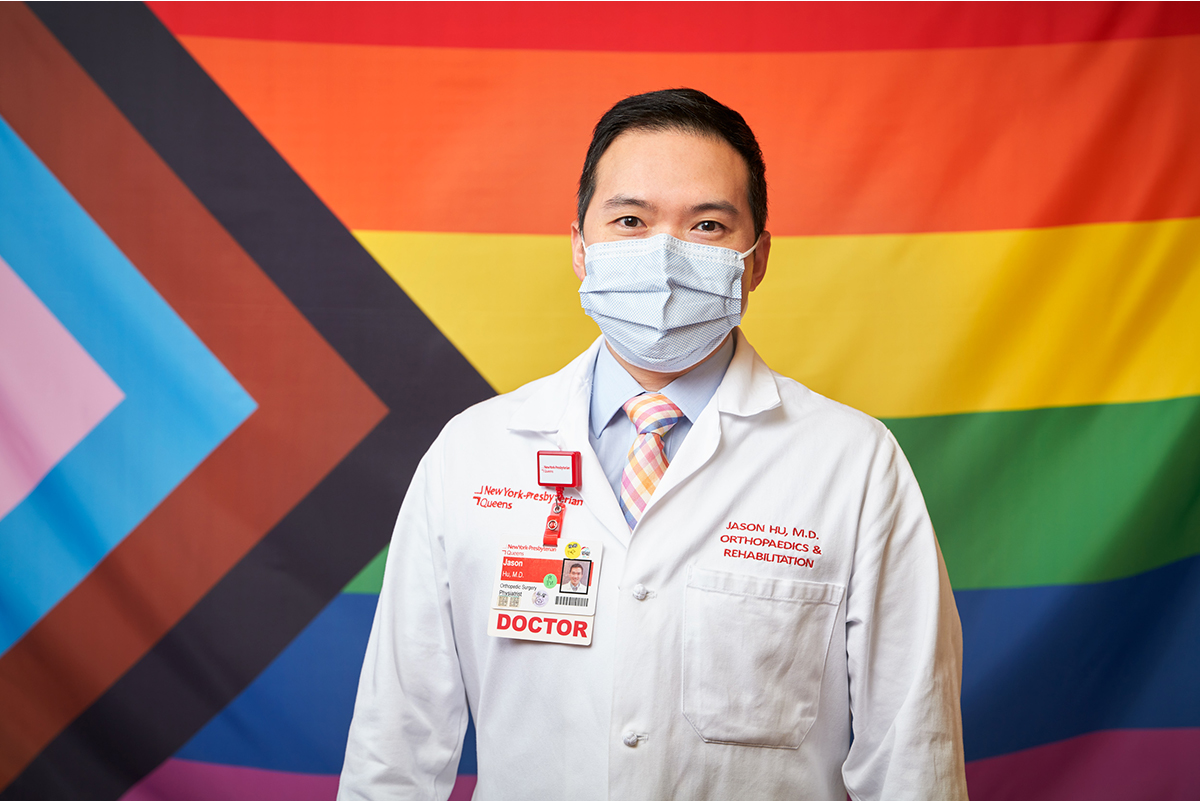
This “homegrown” Queens physician feels pride in having the courage to be his true self.
Dr. Jason Hu
Director of Physical Medicine and Rehabilitation, NewYork-Presbyterian Queens
The year 2016 was monumental for Dr. Jason Hu, director of physical medicine and rehabilitation at NewYork-Presbyterian Queens.
First, he told his parents he was gay. “When I came out to my traditional Chinese parents, it was the most difficult thing in my life but my proudest moment,” he says. “After that I became fearless. That was the day that changed my life.”
Feeling empowered, Dr. Hu then proposed to leaders at NewYork-Presbyterian Queens a plan for how the hospital could better serve the needs of its LGBTQ+ patients. Examples included training staff to address patients with their chosen names and pronouns, and doing outreach and health training for the Queens LGBTQ+ community.
“As I was walking from the C-suite to my office, my inbox flooded with supportive emails saying ‘Sign me up, how I can help?’” he says. “I’ve been very inspired by the support I got from my NYP work community.”
Soon after, Dr. Hu launched the hospital’s LGBTQ+ steering committee and began giving LGBTQ+ cultural awareness and sensitivity trainings across the hospital’s departments. “We talk about healthcare disparities and what LGBTQ+ patients have had to endure and why there is distrust for healthcare workers,” says Dr. Hu. “And we talk about how we can make patients feel more comfortable and trust us. Having the tools is important.”
Celebrating LGBTQ+ staff was another big achievement. That same June, more than 30 employees represented NewYork-Presbyterian Queens in the Queens Pride parade on a rainy Sunday, with the hospital’s president Jaclyn Mucaria marching front and center. “That was a very proud moment for me and the hospital,” says Dr. Hu, adding that it grew in subsequent years to over 100 participants.
Dr. Hu, who is also an instructor in Clinical Rehabilitation Medicine at Weill Cornell Medicine, is proud of the progress the hospital has made. “We are committed to treating every patient with dignity and respect,” he says. “Diversity is fully embraced from the top down.”
He is also proud of his personal growth. “For me, being proud means having the courage to live my authentic life and being true to myself.”
Getting to this place hasn’t been easy for Dr. Hu. Throughout his life, he has faced the double stigma of being gay and Asian. He was bullied in junior high school, and as a student in college in New York City he was assaulted by three men on his campus. Yet he refused to let those incidences break him down. Instead, the experiences are “something that shaped who I am,” he says, “and made me a stronger person, and it gave me more courage to deal with inequities.”
Dr. Hu notes that many of the hospital’s LGBTQ+ patients are people of color who face a double stigma. “We have to be sensitive toward their identity as an LGBTQ+ person but also to their culture, as they may not be out to the family member who accompanied them to the hospital.”
Dr. Hu, who was advised when applying to medical school and residency not to let on in interviews that he was gay, says he hopes to inspire others to be proud of who they are. “I want to show a young person who is interested in health and science that they can find a welcoming path in the medical community.”
Dr. Hu’s advocacy also stems from his loyalty to the hospital and the Queens community. A “NewYork-Presbyterian homegrown physician,” he did his rehabilitation medicine residency through a combined program at NewYork-Presbyterian/Weill Cornell Medical Center and NewYork-Presbyterian/Columbia University Irving Medical Center. After completing a fellowship in Chicago, he knew he wanted to work as a doctor in his hometown: Queens, “the most diverse place in America.” He joined what is today NewYork-Presbyterian Queens, where he has worked for almost 10 years.
“I wanted to give back to my community, and I felt like I could serve the diverse population,” he says, noting that he speaks Cantonese, Mandarin and Spanish.
With COVID-19 having hit Queens hard and the rise in anti-Asian violence, this year has been uniquely challenging. Now, as New York comes out of the worst of the pandemic and communities stand together against the attacks on Asians, Pride is taking on a special significance.
“It’s emergence from the dark,” says Dr. Hu. “My vision for Pride this year is a feeling of hope.”
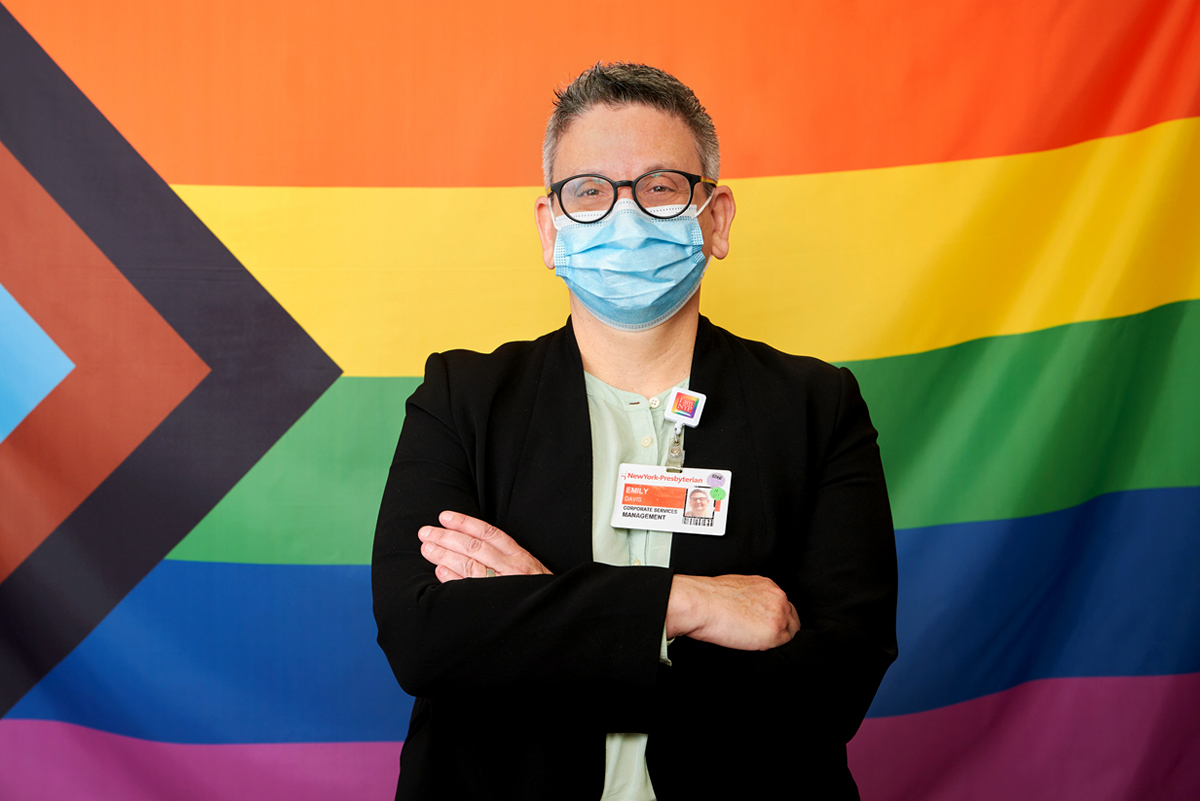
After suppressing her true self for years, Emily is now proud of who she is.
Emily Davis
Director of Human Resources, NewYork-Presbyterian Lawrence Hospital
For as long as Emily Davis can remember, she liked to wear boys’ clothes. While she was growing up, her mother let her shop in the boys’ department, and she played outside only with the neighborhood boys, pedaling her Batcycle with them. Having to wear a skirt for church felt “soul-crushing.”
“I never felt female, but I never really felt male either,” says Davis, director of Human Resources at NewYork-Presbyterian Lawrence Hospital.
While none of that mattered in elementary school, middle school and high school were much harder. Davis recalls a key experience in eighth grade when a classmate told her, “‘So-and-so said you’re a lesbian.’ And I was like, ‘What? That’s ridiculous!’” In “complete denial” that she might be gay, she then began to hide her true self from her friends, classmates, and even herself. “I think it came from not wanting anybody to be able to see who I was,” she says. “But at the same time, I had such a desperate need to fit in. It was a rough way to live. I was tremendously depressed.”
Davis protected herself by leaning into her sense of humor. “If I make fun of me, you can’t, right? That goes back my whole life. That self-deprecation is one of the best protections.”
It wasn’t until she was 21, after spending a college semester in New York City, that Davis officially came out to family and friends. While it wasn’t exactly news to her parents — she feels they had known for quite some time — they were fully supportive. “I have a very supportive, loving family,” she says.
Today, Davis doesn’t worry about fitting in, though she has still kept her self-deprecating humor. This year marks her 10-year anniversary working at NewYork-Presbyterian: first at NewYork-Presbyterian/Columbia University Irving Medical Center in 2011, then at NewYork-Presbyterian Allen Hospital in 2014, and, beginning in 2018, at NewYork-Presbyterian Lawrence Hospital. She is grateful to work in such an open and affirming environment. “There’s no way there’s a better place than this,” she says. “One of the significantly important reasons to work here is, regardless of who you are, you can be you.”
That’s one of the reasons why Davis and her wife decided to have their daughter at NewYork-Presbyterian Morgan Stanley Children’s Hospital. “The care was phenomenal,” she says. “We felt safe and welcomed and loved.” Davis notes that her family continues to get their healthcare at NewYork-Presbyterian. “They have always treated us like the parents we are.”
Davis carries those feelings of openness and safety into her work in Human Resources. “I like to say that I’m pro-employee,” she says. “It very much matters to me that employees feel safe and get the resources that they need.” Those resources include policies, from healthcare to family leave to bereavement, that are inclusive and supportive of LGBTQ+ employees. “It’s critically important that this organization doesn’t just speak words, this organization acts,” says Davis. “The on-the-book policies are equity and equality.”
In addition to her work in HR, Davis serves on NewYork-Presbyterian’s institution-wide Diversity & Inclusion Task Force and is also the co-chair of the Diversity & Inclusion Council and the Inclusion Group at NewYork-Presbyterian Lawrence Hospital. She is often approached at work by fellow members of the LGBTQ+ community for advice and guidance, and, she says, the fact that NewYork-Presbyterian’s leadership includes openly gay senior leaders sends an important message to employees. “That visibility makes a huge difference.”
To Davis, Pride this year means gratitude. “For me, personally, it’s about gratitude for everybody since Stonewall who gave their lives or made an impact, so that I could be legally married to my wife, have a daughter and have legally adopted my daughter, and have the protections that I do,” says Davis. “More globally, it’s about ensuring that the rights that have been gained are never lost.”
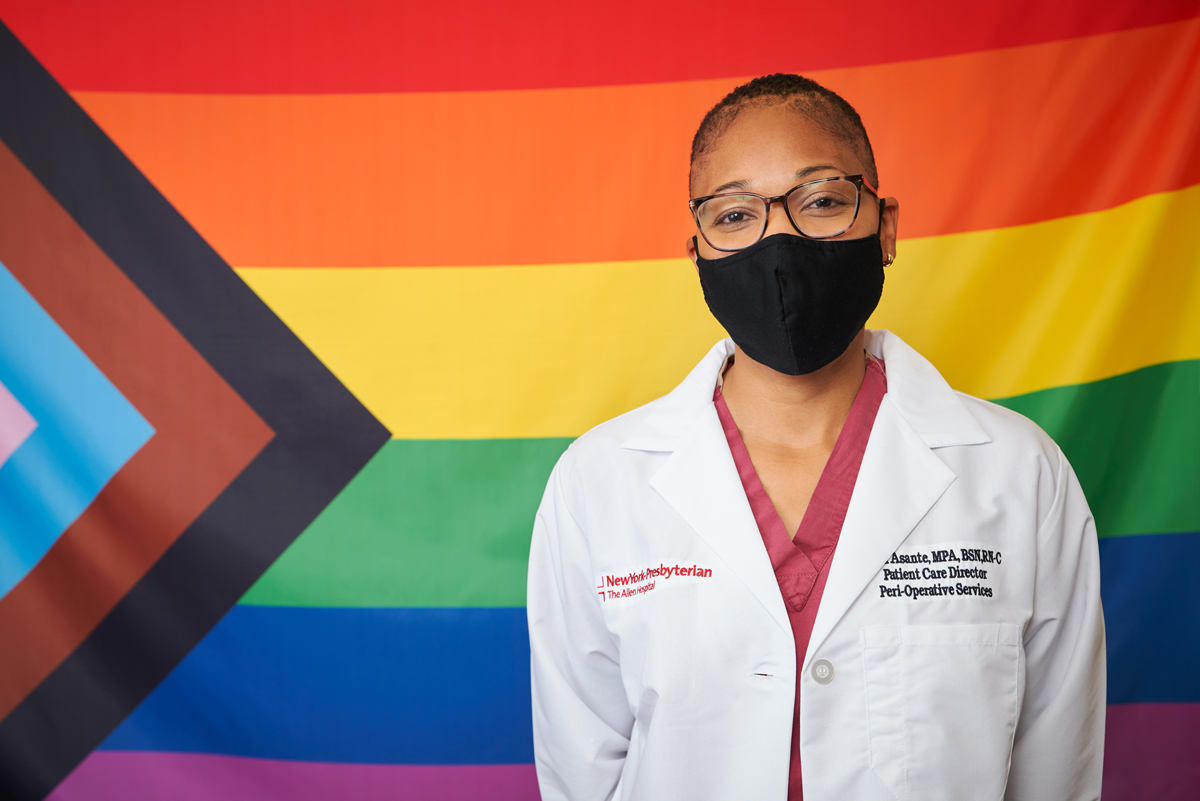
She works hard to provide a safe space for patients, drawing on her own experience with discrimination.
Jihan Asante
Patient Care Director, NewYork-Presbyterian Allen Hospital
Jihan Asante, RN, is part African American, part Ghanaian, part Irish, and part Native American. She is also a proud member of the LGBTQ+ community.
Asante’s rich background fits right in with the diversity of the employees and patients at NewYork-Presbyterian Allen Hospital, where she is a patient care director in the Perioperative Department. “You get a family feel once you walk through the door,” she says. “It is truly diverse — whether it be ethnicities, racial backgrounds, sexual orientation, gender identity, religious beliefs — you can find it all at the Allen. It’s one of the reasons why I love working here. I feel at home and accepted for who I am.”
But Asante hasn’t always felt accepted in a hospital environment. She recalls feeling alienated during the birth of her daughter at another hospital. “It was unfortunate, but it allowed me time to reflect and make sure that I don’t form assumptions of what a family looks like,” she says. “When people come to the hospital — whether it’s to give birth or whether it’s for a heart attack — you are at your most vulnerable. You want to feel safe. You don’t want to feel judged or mistreated.”
Her experiences as a patient have helped Asante bring a deeper understanding to her work. “It’s heartbreaking to know that because of treatment that some individuals have received and their past experiences in hospitals, that deters them from coming to get the healthcare that they need,” she says. “We have to form a trusting relationship with our patients, so that we can treat them all how we want to be treated.”
NewYork-Presbyterian Allen Hospital has spent the last several years laying the groundwork for being an affirming, safe place for the LGBTQ+ community. The corridors now have gender-neutral bathrooms, patients are met with more inclusive intake forms, and staff participate in training and serve on diversity committees. Asante says she has received positive feedback from LGBTQ+ patients. “We’re working hard to provide a safe space for patients. We still have room to grow, but we’re definitely moving in the right direction.”
Growth — both personal and professional — is something Asante takes very seriously. “As an African American, bisexual mom in a leadership role, there are some individuals who may not agree with me being in my position, or who may find it odd,” she says. She recalls being at a conference when someone looking to speak with the patient care director introduced herself to her white colleague, ignoring Asante. “I use those experiences to push me further and harder,” she says. “I’m a proud member of the LGBTQ+ community. I am very proud of who and where I am. All of the negative experiences that I have gone through, I use as fuel to keep going.”
Her perseverance and drive were tested last spring during the first wave of the COVID-19 pandemic. Many departments were redeployed to the front lines, including Asante’s team. Each morning for weeks, she needed to assign members of her team to work in different areas of the hospital that were hit hard. “It was extraordinarily tough,” she recalls, “and I am extremely proud of my periop team. They stepped up to help their emergency department and other colleagues.”
In the wake of the pandemic, this year’s Pride Month feels different for Asante. “The dedication and commitment witnessed during the COVID crisis revealed the opportunity for all walks of life to treat everyone with love, compassion, and tolerance.”
To Asante, Pride shouldn’t be celebrated just for one month but year round. “Within the celebration of PRIDE lives the resistance — resistance against police brutality, resistance against homophobia, racism, unjust treatment, inequities in employment, education, and healthcare,” she says. “To me, Pride this year symbolizes perseverance, courage, strength, and a daily determination to do better.”

